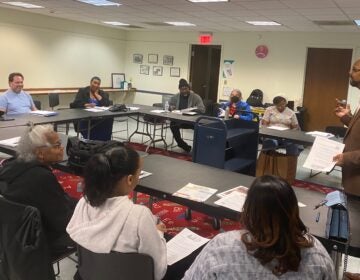Blackboard Labs arts initiative receives Cohen Award
This month, Blackboard Labs, a youth arts initiative under the umbrella of the East Falls-based non-profit, Resources for Human Development (RHD), received its first-ever grant from the Philadelphia Cultural Fund as well as the 9th Annual Councilman David Cohen Award.
Though headquartered in Philadelphia, RHD (founded in 1970) operates in 14 states and sponsors and supervises over 160 “managed human service programs,” including Blackboard Labs.
According to Blackboard Labs Program Director Allison Dean, the hip-hop rooted youth creative arts organization, where participating teens write and record their own music with the help of mentors, counselors and teachers, fills a crucial need in Philadelphia’s education landscape.
Philly’s after-school gap
Blackboard Labs was officially launched in 2010 after a year-long conversation between Dean, Curriculum Director Jim Wells, and other supporters. “There’s a huge gap in Philadelphia in terms of positive youth programming youth actually want to go to,” Dean said.
According to Dean, lack of school district funding for after-school programs, neighborhood issues that spill into recreation centers and older teens with nothing to do after the final bell all contribute to the problem.
Blackboard’s drawing board
Wells received his Master’s in Education from the University of Pennsylvania and was often frustrated by the difficulty he saw in integrating classroom learning and the real world. Throughout his graduate program he was driven to “find authentic ways to use hip-hop in the classroom,” to inspire learning and creative expression.
The seed for Blackboard Labs grew out of Wells’s post-Master’s stint at a north Philadelphia middle school, whose principal was a Penn faculty member and invited Wells in as a writing teacher.
Using a microphone and laptop in any available space, from classrooms to cafeterias, Wells began using the language and music of hip-hop to encourage his students’ writing projects. When Dean observed the classes in action, she suggested a partnership to bring a youth hip-hop recording program to the next level.
Now, in addition to other workshops and occasional showcases, Blackboard Labs offers a weekly after-school session in a recording studio at 12th and Callowhill.
Despite launching with more structured lessons – a specific song for the kids to analyze and an assigned topic for their own writing – Wells found that a looser approach worked best.
“As far as our big goals for the program, we’re really less interested in the musical product than we are in modeling for the kids cooperative and positive artistic communities for themselves,” he says.
“It’s a shifting of the dynamic,” Dean explains. “Instead of saying, ‘we’re adults and you should listen to us,’ we’re saying ‘what do you want to do?'”
Wells says that at its best, the program is driven by the interests of the students, who range from age 13 to 19 (those over 19 can return as mentors for younger kids). “When the program’s going the way it’s supposed to, I basically do nothing for the three hours I’m there,” Wells quips.
Quelling violence between neighborhoods
Dean adds that another value of Blackboard Labs is that participating kids are drawn from all over the city. “It forms friendships that probably wouldn’t have happened without a program like this,” she says – a nice counterpoint to worries about potential violence when Philadelphia teens from rival neighborhood groups land in the same classrooms due to looming school closures.
“It was very important to [Councilman Cohen] that the Cultural Fund be not just for artistic groups in the city, but also groups that had a real push toward economic and social justice,” Wells says of receiving the Fund’s Cohen Award.
Cutting out curse words
Dean and Wells admit that there have been some barriers in attracting kids to the program, including a no-cursing policy.
Wells understands that kids might have a mixed reaction at first: “A hip-hop after school program and they don’t let me curse? That sounds incredibly corny.”
Under the program’s rules, youngsters have “100 percent freedom” over what they put down on paper, but if they want to record, it has to be edited until it’s “radio-friendly.”
Participating teens are looking forward to the planned summer release of a Blackboard Labs mix tape and showcases to share their work.
WHYY is your source for fact-based, in-depth journalism and information. As a nonprofit organization, we rely on financial support from readers like you. Please give today.




